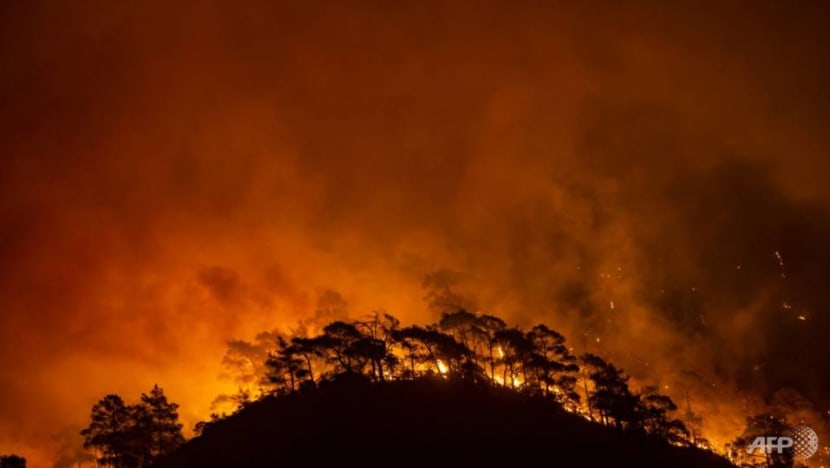Deadly summer of extreme weather as climate change bites

Marmaris on the Aegean Sea saw flames simmer across the crests of forest-covered hills as Turkey fights deadly wildfires AFP/Yasin AKGUL
PARIS: Climate scientists have long warned that the 21st century would see more natural disasters made worse or more likely by global warming.
But a cascade of deadly extreme weather this summer in the northern hemisphere could make 2021 the year when climate predictions became a reality that can no longer be ignored.
From Death Valley-like temperatures in Canada to killer floods in China and Europe, we look at some of the worst disasters so far as the IPCC, the UN's climate change body, meets in Geneva.
THE MEDITERRANEAN BURNS
Forest fires are raging around the Mediterranean from Turkey to Spain, with tourists evacuated in Italy and Greece and eight killed in the deadliest Turkish wildfires in decades.
The European Union sent three firefighting planes to Turkey on Monday (Aug 2) as neighbouring Greece roasted in its worst heatwave since 1987.
READ: Wildfires blaze on in drought-hit Turkey as criticism grows
Greek Deputy Civil Protection Minister Nikos Hardalias said "we are no longer talking about climate change but about a climate threat".
DELUGE IN CHINA
The death toll in floods that hit China last month rose to 302 on Monday, with the central city of Zhengzhou deluged by a year's worth of rain in just three days.
READ: Death toll from flooding in China's Henan province jumps to 302
Torrents of muddy water carried cars through the streets, and people were trapped in road tunnels and the subway system as the waters mounted.
CANADA'S HEAT DOME
In late June, western Canada was caught under a "heat dome", a phenomenon causing scorching temperatures when hot air is trapped by high pressure fronts.
The country broke its record high temperature several times, finally hitting 49.6 degrees Celsius (121 degrees Fahrenheit) in the village of Lytton on June 30. Lytton was then mostly destroyed by fire.
The US Pacific northwest states of Washington and Oregon were also badly affected.
READ: Millions sweltering in US west as Canada takes emergency steps
The exact death toll is not yet known but several hundred people are likely to have perished.
A study by a group of leading climate scientists found that the weather conditions would have been "virtually impossible" without human-caused climate change.
The World Weather Attribution group said global warming caused by greenhouse gas emissions made the June heatwave at least 150 times more likely to happen.
DEADLY FLOODS IN EUROPE
In mid-July western Europe was hit by devastating floods after torrential rains ravaged entire villages and left at least 209 people dead in Germany and Belgium, as well as dozens missing.
The flooding also caused damage in Luxembourg, the Netherlands and Switzerland.
READ: Germans question handling of floods as hopes of finding survivors fade
Up to two months' worth of rainfall came down in two days in some parts of the region, waterlogging soil that was already near saturation.
CALIFORNIA WILDFIRES
Triggered by an alarming drought, the wildfire season is just starting in the American West where thousands of firefighters have already had to tackle more than 80 large blazes.
With 66 still burning and 3.4 million acres ravaged, President Joe Biden said at the weekend that climate change can no longer be ignored.
Some fires, including the Dixie blaze in northern California, have grown so large they are generating their own weather systems.
READ: California wildfire flares but within line crews have built
Marcus Kauffman, a specialist with the Oregon forestry department, said the blaze "feeds on itself" and has even been causing its own lightning.










